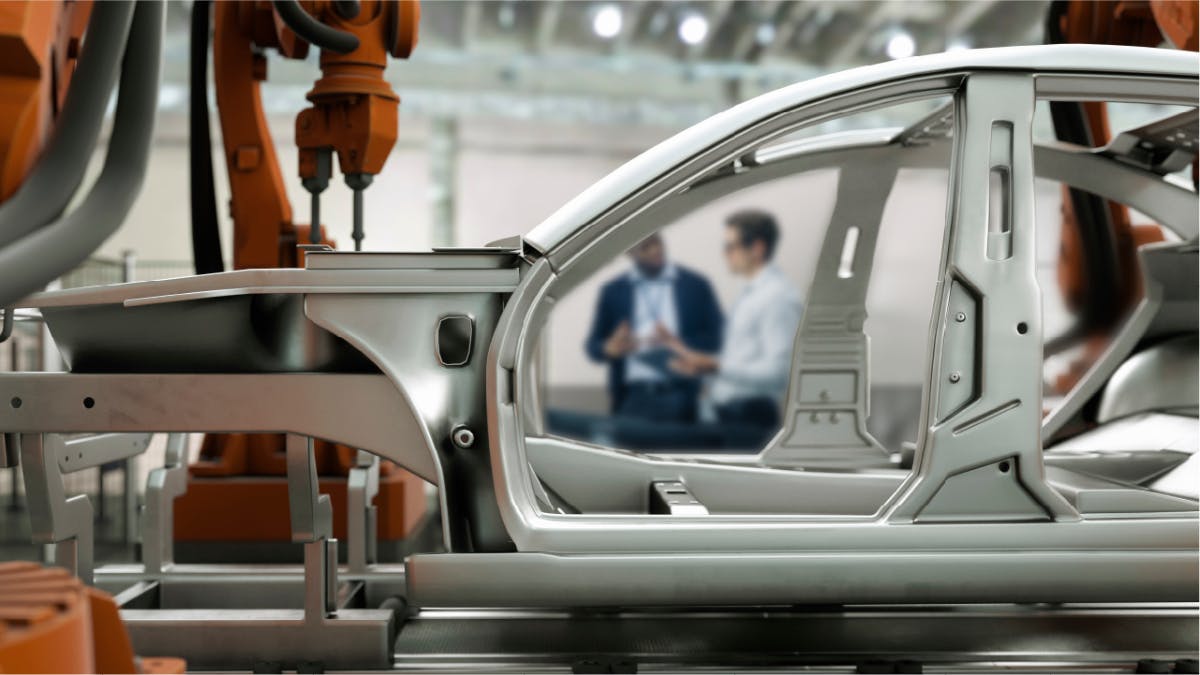The traditional product development process in automotive manufacturing puts the launch at risk of expensive rework and delays. That is because manufacturers must halt operations to debug the controllers on live equipment if a production line needs to be commissioned or changed. With virtual development, automotive manufacturers can develop all aspects of the manufacturing line to evaluate machines, product lines, and plant design early before committing to costly physical builds.
In this webinar, discover the many benefits of virtually developing your manufacturing line and how this allows manufacturers to optimize it before going into operation, so it runs right the first time—leading to a flawless launch of your line. Register now!
Virtually design, simulate, test, and commission the manufacturing plant and line
Virtual development is critical to achieving a complete smart manufacturing solution because it will modernize multiple steps in automotive OEMs' and suppliers' manufacturing processes. For example:
- Process planning— All disciplines create their plans leveraging the single collaboration backbone, creating a virtual version of individual work cells and the complete line.
- Process validation— Simulate production processes, evaluate different line configurations, and identify improvements based on results.
- Production planning— Implementation of automation logic and digital twin simulations to virtually commission the production line validating that the machines and cells are connected through data flows, allowing them to work together as they should produce high-quality parts at launch.
Virtually optimize the production line before committing to costly physical builds
The virtual development process allows OEMs and suppliers to rehearse the launch of a new production line digitally before physically building it. With a comprehensive digital twin of production, machines, product lines, and plant designs can be evaluated early, allowing for numerous ‘what if’ scenarios before costly physical builds are committed. This helps manufacturers gain actionable insights that can help them optimize energy and raw materials to achieve sustainability targets with minimum manufacturing development and launch disruption while reducing errors, rework, safety issues, and costs.
Identify assembly issues before they are encountered on the line
Virtual manufacturing development combines product data, sensors, software, and programming automation to fully connect operations and realistically predict the behavior of individual manufacturing assets. Through human simulation, automotive manufacturers can also test plant workstations' effectiveness, safety, and ergonomics without risking real human operators. Because of this, operations become more predictable, allowing automotive manufacturers to resolve potential issues before they are encountered on the line.
Watch the webinar to learn more about how virtual manufacturing development can help you execute a flawless launch despite the changing demands in the automotive landscape— Register now!
À propos des intervenants

Greg Roth
Directeur des solutions Automobile et Transports
Greg Roth est responsable des solutions pour le secteur de l'automobile et des transports au sein de Siemens Digital Industries Software.
Avant d'exercer ce rôle, M. Roth a occupé des postes chez Ford Motor Company, Eaton Corporation et Amcor Packaging. Plus récemment, il était ingénieur en chef pour les services d'IAO et de NVH chez ZF-TRW Automotive North America Braking Systems à Livonia, dans le Michigan.
À son poste actuel, il soutient les technologies et processus de CAO, d'IAO et de PLM pour les entreprises au niveau mondial, ce qui leur permet de réduire considérablement les coûts et les délais de développement des produits, tout en améliorant la qualité globale.
M. Roth est titulaire d'un Master of Science en ingénierie mécanique de l'université du Michigan, d'un Master of Science en ingénierie électronique et des contrôles informatiques de la Wayne State University et d'un Bachelor of Science en ingénierie mécanique de la Michigan State University.

Bryan Carr
Consultant en solutions Automobile et transports
Bryan Carr est consultant en solutions chez Siemens et dispose de plus de vingt ans d'expérience. Au cours de sa carrière chez Siemens, il a occupé de nombreuses fonctions et a eu l'occasion de travailler dans différents secteurs. Actuellement, Bryan travaille sur l'aide à apporter aux équipementiers automobiles et aux entreprises de niveau 1 pour qu'ils atteignent leurs objectifs en matière de transformation numérique et d'industrie 4.0. Lorsqu'il n'est pas occupé à expliquer les vertus d'un jumeau numérique complet, Bryan passe son temps au milieu des ruisseaux à truites, à rêver que les poissons soient plus faciles à attraper.
